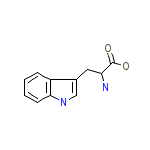NSC 13119




NSC 13119 Brand names, NSC 13119 Analogs
- (-)-Tryptophan
- (S)-Tryptophan
- (S)-a-Amino-1H-indole-3-propanoic acid
- (S)-a-Amino-b-indolepropionic acid
- (S)-a-Aminoindole-3-propionic acid
- 1H-Indole-3-alanine, (S)-
- 1H-Indole-3-propanoic acid, a-amino-, (S)-
- 2-Amino-3-indolylpropanoic acid
- 3-Indol-3-ylalanine
- EH 121
- L-(-)-Tryptophan
- L-Alanine, 3-(1H-indol-3-yl)-
- L-Tryptophane
- Lyphan
- NSC 13119
- Tryptophan
- Tryptophan, L- (8CI)
- Tryptophane
- alpha-Amino-beta-(3-indolyl)-propionic acid
- h-Trp-oh
- l-a-Aminoindole-3-propionic acid
- l-b-3-Indolylalanine
- Alti-Tryptophan
NSC 13119 Brand Names Mixture
- No information avaliable
NSC 13119 Chemical_Formula
C11H12N2O2
NSC 13119 RX_link
No information avaliable
NSC 13119 fda sheet
NSC 13119 msds (material safety sheet)
NSC 13119 Synthesis Reference
No information avaliable
NSC 13119 Molecular Weight
204.228 g/mol
NSC 13119 Melting Point
280-285 oC
NSC 13119 H2O Solubility
Soluble
NSC 13119 State
Solid
NSC 13119 LogP
-1.429
NSC 13119 Dosage Forms
Capsules, Tablets
NSC 13119 Indication
Tryptophan may be useful in increasing serotonin production, promoting healthy sleep, managing depression by enhancing mental and emotional well-being, managing pain tolerance, and managing weight.
NSC 13119 Pharmacology
Tryptophan is critical for the production of the body's proteins, enzymes and muscle tissue. It is also essential for the production of niacin, the synthesis of the neurotransmitter serotonin and melatonin. Tryptophan supplements can be used as natural relaxants to help relieve insomnia. Tryptophan can also reduce anxiety and depression and has been shown to reduce the intensity of migraine headaches. Other promising indications include the relief of chronic pain, reduction of impulsivity or mania and the treatment of obsessive or compulsive disorders. Tryptophan also appears to help the immune system and can reduce the risk of cardiac spasms. Tryptophan deficiencies may lead to coronary artery spasms. Tryptophan is used as an essential nutrient in infant formulas and intravenous feeding. Tryptophan is marketed as a prescription drug (Tryptan) for those who do not seem to respond well to conventional antidepressants. It may also be used to treat those afflicted with seasonal affective disorder (a winter-onset depression). Tryptopan serves as the precursor for the synthesis of serotonin (5-hydroxytryptamine, 5-HT) and melatonin (N-acetyl-5-methoxytryptamine).
NSC 13119 Absorption
No information avaliable
NSC 13119 side effects and Toxicity
Oral rat LD50: > 16 gm/kg. Investigated as a tumorigen, mutagen, reproductive effector. Symptoms of overdose include agitation, confusion, diarrhea, fever, overactive reflexes, poor coordination, restlessness, shivering, sweating, talking or acting with excitement you cannot control, trembling or shaking, twitching, and vomiting.
NSC 13119 Patient Information
It is important that your doctor check your progress at regular visits, to allow dosage adjustments and help reduce any side effects.
NSC 13119 Organisms Affected
Humans and other mammals














